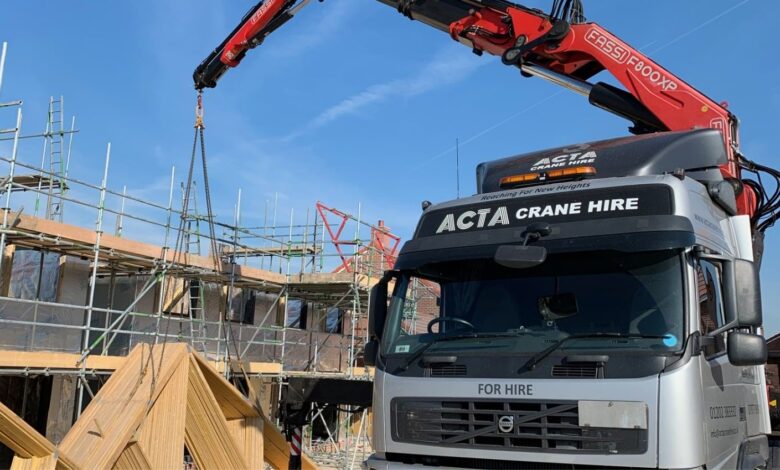The Future of Crane Hire in Construction

Crane hire has always played a key role in the construction industry. Whether lifting steel beams, concrete panels, or modular units, cranes make the impossible possible. But like the rest of construction, crane hire is changing fast.
With advances in technology, growing demand for sustainability, and tighter regulations, the crane hire market is evolving. Contractors now expect smarter equipment, faster service, and greater flexibility.
So what does the future look like for crane hire in construction? Let’s take a closer look.
Smarter Equipment with Built-In Technology
Cranes are becoming more intelligent. New models now feature built-in telematics, which provide real-time data on load weights, fuel consumption, boom angles, and operating time. This allows for better planning and safer lifts.
GPS tracking and remote diagnostics also help reduce downtime. Hire companies can monitor the health of a crane while it’s operating on site. If an issue arises, it can be fixed before it causes a breakdown.
As automation continues to grow, we’ll see more semi-autonomous features, especially in larger tower cranes and mobile units. These changes help operators work more efficiently and reduce human error on complex lifts.
Digital Lift Planning and Site Integration
Lift planning is no longer done with pencil sketches or basic CAD files. In the future, crane hire companies will rely heavily on digital planning tools. These include 3D modelling, BIM integration, and even augmented reality to visualise lifts before they happen.
This level of planning improves communication across teams, especially on busy construction sites. It also helps avoid surprises during the lift and keeps projects running smoothly.
Contractors will benefit from working with crane hire firms that offer this advanced level of support.
Increased Demand for Sustainability
The construction sector is under pressure to reduce emissions, and crane hire is no exception. Traditional diesel-powered cranes are being replaced, or at least supplemented, by electric or hybrid alternatives.
Electric cranes produce zero emissions on-site and are much quieter, making them ideal for work in urban or residential areas. While these models are still emerging, demand is growing fast.
Crane hire in Dorset and other regional providers will likely continue to expand their fleets to include more eco-friendly equipment, helping contractors meet green building standards.
Shorter Lead Times and Flexible Hire Terms
Construction projects move faster than ever. Delays are costly, and flexibility is key. That’s why the crane hire market is adapting to offer shorter lead times, rapid dispatch, and more flexible hire durations.
Rather than committing to week-long hires, contractors may want cranes on a daily or even hourly basis. Hire firms are responding by creating more agile scheduling systems and offering better online booking options.
In future, clients may be able to check crane availability in real-time and book instantly via an app or web portal.
Focus on Safety and Compliance
Health and safety will always be a top priority in construction. But as regulations become stricter and more detailed, crane hire services will need to stay ahead of the curve.
Expect to see more emphasis on operator certifications, advanced safety tech, and comprehensive method statements. Equipment will include automated safety features such as load sensors, stability alarms, and anti-collision systems.
Hiring from a company that takes safety seriously doesn’t just protect workers, it also reduces the risk of downtime and legal issues.
Rise of Modular Construction and Prefab Lifts
Modular and prefabricated building methods are reshaping the way structures are assembled. Entire rooms, bathroom pods, and even full apartment sections are built off-site, then lifted into position.
This trend is increasing the demand for precise, heavy-duty crane work. Lifts need to be scheduled to the minute and executed without error.
Crane hire services that understand the needs of modular construction, such as reliable timing, exact positioning, and equipment with long reach, will be in high demand.
Data-Driven Decision Making
The use of data across construction projects is growing, and crane hire is joining that movement. Historical data from crane operations can be used to forecast project timelines, identify cost-saving opportunities, and improve future performance.
Clients may start asking for detailed reports post-lift, showing crane usage, efficiency, and any delays. This type of data helps with future planning and justifies investment in professional hire services.
Crane companies will likely invest more in digital tools to deliver this level of insight as standard.
Increased Role of Specialist Providers
With lifts becoming more technical and job sites more regulated, general equipment hire firms may struggle to keep up. Instead, specialist crane hire providers will continue to dominate the market.
These companies offer more than just equipment. They deliver full lift planning, skilled personnel, safety documentation, and ongoing support. This complete service package will become more valuable as projects grow in complexity.
Contractors seeking expert support will turn to dedicated teams like crane hire in Dorset to ensure reliable results and peace of mind.
Remote Support and On-Demand Assistance
In the near future, remote support will become standard in crane hire. Using cameras, mobile apps, or augmented reality headsets, site teams will be able to connect with off-site experts instantly.
This helps resolve setup issues, answer technical questions, or confirm lift plans on the fly. It cuts down delays and keeps operations moving.
Remote support also means that even smaller crane hire operations can provide high-quality guidance to customers across wider regions.
Final Thoughts
The future of crane hire is efficient, tech-driven, and focused on customer needs. As construction evolves, crane services will continue to adapt, offering smarter equipment, safer lifts, and more flexible solutions.
Contractors who work with forward-thinking providers will benefit from faster projects, lower risk, and stronger outcomes. Whether it’s a simple roof truss lift or a complex modular install, the crane hire industry is ready for what’s next.


